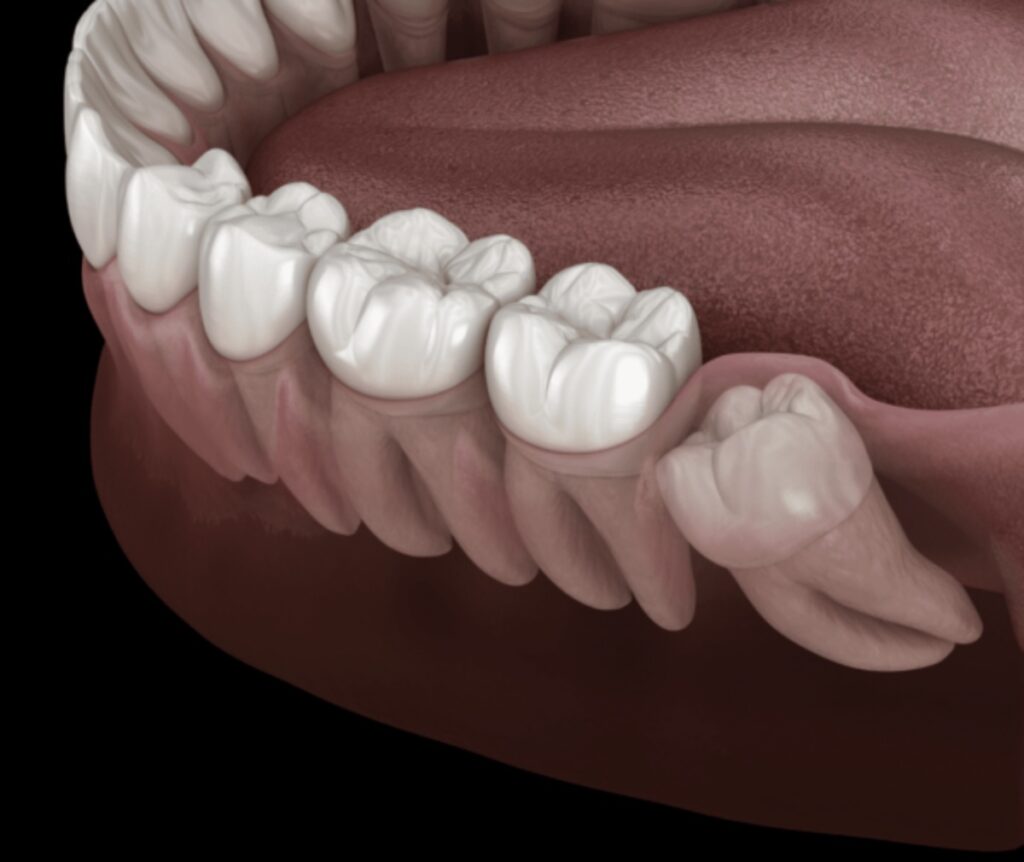Wisdom teeth, also known as third molars, are the last set of molars to emerge in the mouth. These teeth usually develop during the teenage years, but they may not cause any problems until later in life. In some cases, wisdom teeth can cause discomfort, infection, and other complications that require their removal. In this article, we’ll explore the when and why of wisdom teeth removal.
Understanding Wisdom Teeth
Wisdom teeth are the third molars located at the back of the mouth. Most people have four wisdom teeth, but some individuals may have more or less. Wisdom teeth usually emerge between the ages of 17 and 25, but they may erupt earlier or later in some cases.
Wisdom teeth are often problematic because they can grow in at an angle, become impacted, or fail to emerge properly. When this happens, the wisdom teeth can push against the adjacent teeth, cause discomfort, and increase the risk of infection.
When to Remove Wisdom Teeth
Not all wisdom teeth require removal. However, in some cases, removing the wisdom teeth can prevent future problems and alleviate current symptoms. Here are some common reasons why wisdom teeth may need to be removed:
- Impacted Wisdom Teeth: If a wisdom tooth doesn’t have enough space to emerge or grows in at an angle, it can become impacted. This can lead to pain, swelling, and infection.
- Overcrowding: Wisdom teeth can push against adjacent teeth and cause overcrowding. This can lead to misalignment of the teeth, difficulty in cleaning teeth, and dental decay.
- Infection and Inflammation: Wisdom teeth that partially erupt from the gum tissue can create an opening that allows bacteria to enter the gums, leading to infection and inflammation.
- Cysts or Tumors: In rare cases, wisdom teeth can cause cysts or tumors to form, leading to damage to the jawbone and other teeth.
- Orthodontic Treatment: Removing wisdom teeth may be necessary before orthodontic treatment, such as braces or aligners, to create enough space for the teeth to move.
If you experience any of these symptoms, it’s essential to visit an oral surgeon or dental professional to assess whether wisdom teeth removal is necessary.
Wisdom Teeth Removal Procedure
Wisdom teeth removal is a common outpatient procedure that can be performed by an oral surgeon. The procedure involves removing one or more wisdom teeth, depending on the individual’s needs.
Before the procedure, the team will perform a dental exam and take X-rays to assess the position and condition of the wisdom teeth. The oral surgery team will then administer local anesthesia or sedation to numb the area and ensure that the patient is comfortable throughout the procedure.
During the procedure, the oral surgeon will make an incision in the gum tissue and remove the wisdom tooth. If the tooth is impacted or difficult to remove, they may need to remove the surrounding bone tissue to access the tooth. After removing the tooth, the surgeon will clean the area and stitch the incision to promote healing.
Recovery and Aftercare
After the procedure, the team will provide instructions for aftercare to ensure proper healing and prevent complications. Here are some tips for a smooth recovery:
- Bite on Gauze: After the procedure, the dentist will place a gauze pad on the extraction site to control bleeding. Bite down on the gauze pad for at least 30 minutes to promote clotting.
- Use Ice Packs: Apply ice packs to the cheeks to reduce swelling and discomfort.
- Eat Soft Foods: Avoid hard, crunchy, or spicy foods for the first few days after the procedure. Opt for soft foods, such as soups, smoothies, and mashed potatoes.
- Avoid Drinking from a Straw: Drinking from a straw can dislodge the blood clot and delay healing. It’s best to avoid straws for the first few days after the procedure.
- Practice Good Oral Hygiene: Brush your teeth gently and avoid the extraction site for the first few days. Rinse your mouth with saltwater to promote healing and prevent infection.
- Take Medications as Prescribed: The dentist may prescribe painkillers or antibiotics to prevent infection and alleviate pain. Take the medications as prescribed and avoid aspirin, which can increase bleeding.
Most people recover from wisdom teeth removal within a week or two. However, it’s essential to follow the oral surgeon’s instructions and attend follow-up appointments to ensure proper healing.
Conclusion
Wisdom teeth removal is a common dental procedure that can prevent future problems and alleviate current symptoms. If you experience any discomfort or signs of infection related to your wisdom teeth, it’s essential to visit a dental professional to assess whether removal is necessary.
The team of experts at Green Valley Oral Surgery practice a full scope of oral and maxillofacial surgery with expertise ranging from corrective jaw surgery to wisdom tooth removal. They are happy to help assess your current situation and provide a plan should extraction be required. By understanding the when and why of wisdom teeth removal, you can make informed decisions about your dental health and wellbeing.
